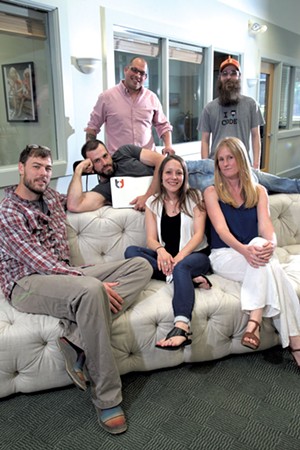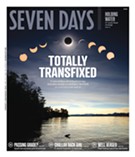Published June 2, 2015 at 10:40 a.m.
Last year, when Kyle Clark and Aaron Pollak launched their Burlington startup, Designbook, they chose a name that reflected the company's mission and their mutual background in engineering. For engineers, a design book is for jotting down initial concepts, sketching designs, tracking the progress of current projects and planning future ones. Akin to a reporter's notebook or an artist's sketch pad, it's a fundamental tool of the trade, a place where great ideas are born and nurtured.
In that spirit, Clark and Pollak created Designbook as an online social networking platform to bring together entrepreneurs, investors and other potential collaborators. What they didn't intend to do when they named their business was to go head-to-head with an online giant.
Designbook, which went live for beta testing last November, allows budding entrepreneurs, or "founders," to create free public profiles that explain their business concepts, then to crowdsource the resources they need to get their enterprises off the ground.
Similarly, collaborators — or people with the skills, knowledge and experience that startups need — can post profiles and market themselves. Investors can join, too, and follow specific startups, learn about their teams, receive news feeds on their progress and, eventually, buy shares in those companies.
Those in the local startup community, including aspiring entrepreneurs, venture capitalists and state regulators, say that Designbook serves a critical and growing need in Vermont — for an intermediary that facilitates and simplifies what can be complex and technical business arrangements.
But now another social network with "book" in its name — Facebook — has challenged Designbook's trademark filing with the U.S. Patent and Trademark Office. A Facebook representative declined to comment publicly on the Designbook trademark dispute. In the past, however, the titan's lawyers have aggressively gone after companies with either "face" or "book" in their names, claiming such use confuses the public into believing the companies are Facebook affiliates.
In 2010, Facebook threatened to sue the travel website PlaceBook, which later changed its name to TripTrace to avoid litigation. A year later, Facebook filed suit against Teachbook, a social network for professional educators. In September 2012, Teachbook ceded to Facebook's demands and changed its name to TeachQuest.
This time, however, Facebook is facing off against two smart, ambitious, competitive entrepreneurs who aren't likely to back down from a fight — of any kind. Clark, 35, is a former National Hockey League player with the Washington Capitals who earned a reputation as an on-ice pugilist. While playing on the U.S. Junior National Team, he held the league record for most penalty minutes in a single season; on the AA team Richmond Renegades, Clark racked up more fights than games.
"I wasn't that good of a hockey player, but I wasn't afraid to fight anybody," admits the 6-foot-6-inch Essex native. "I did jujitsu training all summer and fought all winter."
Pollak is no shrinking violet, either. The 30-year-old Charlotte native is a nationally ranked amateur trapshooter who is considered deadly — in competition — with a shotgun. Both he and Clark say they have no intention of surrendering the Designbook name and call Facebook's challenge "bullying" and "totally frivolous."
"Their opposition is that we're creating an online community using the '-book' suffix," Pollak explains. "Well, that means 'yearbook' is out and 'phone book' is out. The concept is pretty daft."
"We have the gonads to say this is wrong," Clark adds. "Any progressive new business is going to create an online community. You can't say that Facebook owns the internet. So screw them."
Designbook, its founders claim, differs significantly not just from Facebook but from other crowdfunding platforms such as Kickstarter and GoFundMe. While the former is geared toward creative projects and the latter toward personal dreams, Designbook enables startups to crowdsource entrepreneurial teams with "complementary skill sets and consistent passions."
For example, a founder may need one collaborator who's good at marketing, a second who's an ace accountant and a third who's an engineering whiz. Designbook is set up to bring them together without creating confusion over who owns what. Contributors go through a "vesting schedule," or probationary period, until they hit their "cliff," at which point they get some initial equity back, then a trickle of more equity over the term of their contract.
In short, Designbook provides a legal and financial framework whereby everyone involved in a business knows exactly what his or her investment — in cash or labor — is worth. That's important, Clark notes, because the U.S. Securities and Exchange Commission regulates many of those transactions.
"If every entrepreneur had to spend their most valuable asset — their time — and learn how the SEC wants them to file these [documents] with them, it would be a very inefficient use of their time," Clark says. "That transaction is what we do. We make that easy for people. Founders can say, 'This is what I need, and this is what I'm willing to give you for it.'"
Michael Pieciak, deputy commissioner of securities for the Vermont Department of Financial Regulation, says the timing of Designbook's launch was fortuitous. Just last year, the state revised its regulations to make it easier for Vermont companies to make public offerings to Vermonters. The state, Pieciak says, is lucky to have Designbook "coming online to fill out a really important piece of the puzzle for local investing."
How did Pollak and Clark conceive of Designbook? In part, through their own individual failures. Both had designed innovative products that never got the resources they needed to come to fruition.
Pollak's senior capstone project at Rensselaer Polytechnic Institute was an all-in-one device that combined a phone, modem and cable TV box. He and his team engineered the device but never followed through after graduation. Two years later, Pollak says, Comcast released a similar product.
Clark, who earned his engineering degree at Harvard University after his hockey career, produced a senior capstone project combining his dual passions of flying and motorcycling. A licensed pilot, Clark invented a new way to interface with the aircraft — which, he explains, mimics the more intuitive body movements of riding a motorcycle.
Clark built a flight simulator, won Harvard's thesis-of-the-year award for it and then went looking for investors. He raised some capital, he says, but not enough to get his craft off the ground. With a resource like Designbook, he suggests, he might have had more success.
"But this platform is not isolated to flying motorcycles or all-in-one cable boxes. And it's not just money and technical talent [we needed]," Clark emphasizes. "It's also marketing, business, all that type of stuff."
Clark and Pollak met when Clark sold his first company, iTherm Technologies, to Dynapower of South Burlington, where Pollak worked on the team that reviewed the deal. During their six years working together at Dynapower, they often took business trips together and discussed starting a business that would help others launch startups. Both left Dynapower in 2012 and began working on Designbook's business plan a year later.
Currently, most of the 300 startups on Designbook are still in "private status," Clark says, meaning they're either refining their profiles or just directing people to their websites. A handful of this "freshman class" will start seeking investors once Designbook's fundraising engine launches in mid-June.
One such business is Burlington-based divvi, a new mobile app that uses social networking to market consumer products. As divvi founder Richard Morin explains, the app lets consumers recommend products they believe in, then tells users where they can buy them.
As a local designer and entrepreneur, Morin says he knocked on the doors of angel investors and venture capital firms and "did the dance" pitching his business model. But, because Vermont has a limited pool of investors for tech startups, there were only so many doors on which to knock. Once Morin discovered Designbook, he realized it could help him meet other needs, too.
"For us as a small company, we only have so many resources ... and we only have a limited amount of time to build a project, create the marketing plan, create the strategic partnerships and raise money," he says. "[Designbook] gives us an opportunity to outsource a portion of it."
Cairn Cross, cofounder and managing director of FreshTracks Capital, a Shelburne-based venture capital investment firm, says he's "bullish" on the long-term prospects of sites like Designbook. Twenty years ago, Cross explains, entrepreneurs faced a "long, hard slog" finding the right investors and collaborators who believed in their vision. The perfect funder might have been "right over the hill from you," yet nearly impossible to find. Today, he says, Designbook give entrepreneurs "a very good view over the hill."
Cross is also impressed with Clark and Pollak's use of their online platform to power new business-pitch competitions, which are increasingly popular. (Designbook has done five already, including last month's LaunchVT competition.) In the process, Cross says, Designbook gets dozens of local startups to enter their information into the company's database, share it and make new business connections.
"I think that's just good, solid business savvy," he says.
Pollak and Clark are firm believers in the power of crowdsourcing. They even used it to create their company logo, which combines a lower-case D and B and resembles two hands coming together — or people working in a circle. Using the website 99designs, Designbook offered an $800 prize for the winning logo. Within a week, it had 617 submissions from which to choose.
It's unclear whether the Designbook team will have to crowdsource another business need — legal fees and services for its fight with Facebook. Clark and Pollak both say that a David-versus-Goliath fight — like the one Bo Muller-Moore successfully waged with Chick-fil-A over his use of the phrase "Eat More Kale" — could be great for business. That is, Clark cautions, if it doesn't become a distraction or a major financial drain.
"It's a compliment and a pain in the ass at the same time. The fact that they even care to come after us is important," Clark says. "But we're doing something that's fundamentally different from Facebook. You go to Facebook to find out what some guy you passed occasionally in high school had for breakfast. You come to Designbook to do something productive with your online time."
The original print version of this article was headlined "Crowd Engineers"
More By This Author
About the Artist

Matthew Thorsen
Bio:
Matthew Thorsen was a photographer for Seven Days 1995-2018. Read all about his life and work here.
Matthew Thorsen was a photographer for Seven Days 1995-2018. Read all about his life and work here.
Speaking of...
-

In Secretive Facebook Groups, Vermont Women Are Crowdsourcing Men's Red Flags
Feb 7, 2024 -

Burlington Cyclists Band Together to Recover Stolen Bikes
Jul 26, 2022 -

In Disconnecting From Facebook, Vermont's Retreat Farm Hopes to Inspire Others
Nov 24, 2021 -

Season's Readings: Author Stephen Kiernan Dispenses Book Recs
Dec 4, 2020 -

Burlington Resident's Zoom Meeting Meme Goes Viral
Apr 7, 2020 - More »
Comments (3)
Showing 1-3 of 3
Comments are closed.
From 2014-2020, Seven Days allowed readers to comment on all stories posted on our website. While we've appreciated the suggestions and insights, right now Seven Days is prioritizing our core mission — producing high-quality, responsible local journalism — over moderating online debates between readers.
To criticize, correct or praise our reporting, please send us a letter to the editor or send us a tip. We’ll check it out and report the results.
Online comments may return when we have better tech tools for managing them. Thanks for reading.














































